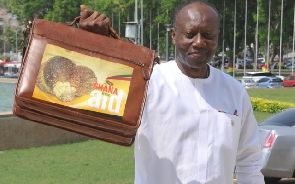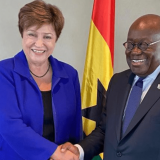Central Bank’s target of US$800-million inflows were by end-March very positive for FX liquidity and price stability.
Further depreciation of Ghana’s Cedi in 2019 is limited based on our outlook on key economic indicators and foreign exchange inflows this year. This expectation firmly stems from our view that we are to witness another period of discipline from the economic authorities regarding the budget deficit.
Ghana delivered a strong performance on the budget in the last two years, which attracted significant portfolio investments into the country. The deficit was reduced from 8.7% of gross domestic product in 2016 to 5.9% of GDP in 2017 and further to 3.8% last year, (rebasing may have influenced this) according to latest data released by the Ministry of Finance on 4 March 2019. While the New Patriotic Party government which came into office at the beginning of 2017 must take credit for this performance, it is also noted that this performance was under the watch of the International Monetary Fund.
The nearly US$1-billion Economic Credit Facility Programme with the Fund came to an end in December (IMF Executive Board to meet in April to appraise Ghana’s performance, the 7th and 8th reviews) so this year marks a fiscal test for the Akufo-Addo government. We are confident that the government will stay within the deficit target. We expect that the new Fiscal Council, (set up by the President last year for the promotion of sustainable fiscal policies) and the enactment of a law this year capping the deficit shortfall at 5% of GDP in any given year, to underpin the restraint.
That said, we observe that for both years, the government had to sacrifice some planned expenditures to achieve the deficit targets as tax revenues underperformed. In 2018 for instance, almost 1 billion Cedis worth of spending was sacrificed as taxes missed the target by 800 million Cedis. We urge the government not to lose focus on enforcing tax compliance this year since it could greatly improve the fiscal outcome and calm a lot of nerves among the investor community. Investors are on tether hooks to see what will happen without the IMF watchdog. While this posture may slow portfolio investments in the first-half, positive budget delivery during the period is bound to convince many people to return to Ghana’s bond market.
Compared with the closing rate in December 2018, the Cedi has lost over 10% to the US Dollar, 2019 year to date, trading currently around 5.51 per dollar. We note that this performance was driven largely by external developments, and on the lighter side by the wait-and-see attitude of investors in relation to the budget as to whether there would still be discipline without an IMF watch.
Talking of external environment, the US Fed’s interest rate increases in 2018 and the US-China trade issues have tilted the risk-on effect in favour of developed markets. Ghana like all emerging and frontier markets has suffered from capital flights. The consequent decline in foreign exchange supply on the local market has impacted the Cedi’s performance.
Ghana is targeting a budget deficit of 4.2% of GDP this year and we foresee the authorities steadily delivering on this through the year. Ghana should, therefore, win back the appetite of offshore investors for its bonds and stocks halfway through the year. This will culminate with the Fed’s target this year to do only two interest rate increases compared with four upward adjustments in 2018. In addition to Ghana’s positive trade balance, which we forecast to remain in surplus for a third year in 2019 on increased hydrocarbon production, we think the Cedi’s losses to the US Dollar will be limited going forward.
Given the recent developments in the exchange rate, we expect inflation numbers for February and March to reflect high pass-through effects of currency weakness before tapering off from April as the authorities take delivery of major foreign exchange supply principally through the Eurobond Programme. Ghana’s inflation eased to 9% in January and we see it remaining between single digit or closely around 10% in the first half, on stable utility prices and increased foreign exchange supply.
The Central Bank is making financing arrangements to replenish its reserves with US$800-million as early as the end of March, according to various reports and government sources. Hopefully, the country’s final two reviews under the IMF Programme will be favourable. This will make way for the disbursement of approximately US$200-million to Ghana.
A Eurobond sale, which we see happening any time after the IMF review is set to boost supply—currently, the target is US$3-billion. A good performance in the cocoa sector also means a busy minor season with Ghana Cocobod ready to draw down US$300-million from its annual syndication. Increased oil production should see the country earn more foreign exchange from the commodity than a year ago— operator of Jubilee and TEN oil fields Tullow Oil Plc forecasts combined production of over 180,000 barrels per day in 2019 from 58,100 barrels per day last year.
Lastly, an initial drawdown of US$647-million of a US$2-billion deal with China’s Sinohydro Corp. for roads may start trickling in this year, which will help to beef up foreign reserves of the country.
Considering Ghana’s restrictive budget, positive trade balance, single digit inflation and the expected foreign exchange inflows, we think that the Cedi’s recent depreciation is short-lived, and stability should return soon.





